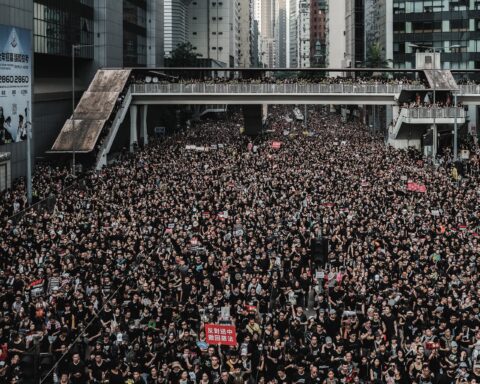How does Donald Trump’s mind work? The Beijing government hasn’t a clue; neither does the rest of the world. Maybe the president-elect’s thinking is a mystery even to himself.
Sensibly, Chinese Communist Party leaders have opted not to interpret Trump’s telephone conversation on Friday with Taiwan’s President Tsai Ing-wen as a deliberate act jettisoning nearly 40 years of careful obfuscation that has kept the peace between Washington and Beijing.
Instead, the men behind the high red wall of the Zhongnanhai leaders’ compound in Beijing decided to say that the phone call was a “petty trick” by Tsai. “For Trump,” said a state-controlled newspaper, “it exposed nothing but his transition team’s inexperience in dealing with foreign affairs.”
So Beijing has decided that for the moment there should be no crisis. Trump, though, seems reluctant to go along with that idea and appears, in fact, to be setting up the Beijing regime as a whipping boy. On Sunday evening he used his preferred method of communication with the world — Twitter — to say:
“Did China ask us if it was OK to devalue their currency (making it hard for our companies to compete), heavily tax our products going into … their country (the U.S. doesn’t tax them) or to build a massive military complex in the middle of the South China Sea? I don’t think so!”
This suggests that, unlike the other promises he has already abandoned, Trump might charge ahead with his campaign vow to stick massive duties on Chinese imports.
That could pose a threat to the survival in power of the Chinese Communist Party — whose Mandate of Heaven is now expressed in the growth of China’s gross domestic product. And that is a far more pressing question for Beijing than the fate of Taiwan
But the Taiwan question cannot be ignored. The Communist Party claims the island and its 23 million people are “a renegade province” that must be gathered into the bosom of Mother China — by force if necessary. Three generations of Chinese have been indoctrinated at school with this mantra, even though it has little historic, legal or political merit. But there is a long history of authoritarian states being mauled to death by the hyper-nationalism they have fostered in order to stay in power.
So there are reasons to applaud the phone call between Trump and Tsai. It is shining a bright light on the iniquities visited upon the people of Taiwan, a vibrant democracy with one of the world’s most successful and sophisticated economies, by the sleazy deal between Washington and Beijing.
The breach of protocol established in 1979 would be far more welcome if someone more trustworthy than Trump were about to become the U.S. president. It’s hard to believe that Trump will see through what he started on Friday, that the ridiculous “one China policy” will be ditched, and that Taiwan will be able to take its proper position as an internationally recognized independent nation.
As with so many U.S. diplomatic follies of the last half century, the blame for this one can be laid at the feet of Henry Kissinger.
Like Trump, Kissinger’s capacity for self-promotion has successfully masked his lack of more useful talents. In 1971, Kissinger was President Richard Nixon’s national security advisor when he went to Beijing to negotiate with Premier Zhou En-lai the establishment of diplomatic relations.
At the time, Washington still recognized as the legitimate government of China the old Kuomintang regime of Chiang Kai-shek, which had fled to Taiwan in 1949 after losing the civil war to Mao Zedong’s communists.
Premier Zhou played Kissinger like a violin. Despite Nixon’s insistence that Taiwan’s independence must be guaranteed, Kissinger told Zhou that he could foresee the island becoming part of China. He also agreed to “acknowledge” China’s claim to Taiwan. This wording — which the Chinese usually translate as “accept” — has remained part of the problem.
(In contrast, when then-Prime Minister Pierre Trudeau was negotiating Canada’s establishment of diplomatic relations with Beijing, he insisted that Ottawa would only “note” the Communist Party’s claim to Taiwan. Most other countries have followed the Canadian model.)
The establishment of Washington-Beijing diplomatic relations meant that the fiction that the Chiang regime in Taiwan was the true government of China could not continue. In 1979, during Jimmy Carter’s presidency, the U.S. ended formal diplomatic relations with Taiwan — though, like most other countries (including Canada), it keeps an unofficial embassy in Taipei and continues to have a military and intelligence relationship with the government.
With this ambiguous diplomatic and legal relationship has gone what is known as the “one China policy,” which Beijing has insisted other governments, especially Washington and Taipei, accept as a condition of economic relations.
In essence this policy says that everyone accepts that there is only “one China.” What constitutes China is left undefined. Beijing, of course, says China includes Taiwan and the Chinese Communist Party is its sovereign authority.
In Taiwan, around 90 per cent of the island’s people want to keep their independence. If pushed, they will say there is indeed only one China — but Taiwan is not part of it.
The same goes in Washington. So for nearly 40 years, peace has been maintained across the Taiwan Strait and relations between Beijing and Washington have continued without serious conflict because everyone has agreed to accept there is “one China” without asking what that means.
U.S. administrations have added a couple of other ambiguities to this “don’t-ask-don’t-tell” approach. There is domestic legislation — the 1979 Taiwan Affairs Act — which requires Washington to help defend Taiwan if it is attacked. It is left up to each Washington administration, however, to decide how enthusiastically it rushes to Taiwan’s defence. As U.S.-China economic interdependence has grown, it has become less and less likely that any Washington administration would go to the wall for 23 million Taiwanese, even if they are part of the democracy circle.
And in a sop to Beijing, successive U.S. presidents have kept well away from any formal or even informal association with their Taiwanese counterparts.
That’s why Trump’s phone conversation with Tsai stands out.
It’s not entirely clear that it has dawned on Trump yet that, on January 20, he will become the U.S. president. He is still acting like someone who just won a game show and is revelling in the attention showered on him by groupies.
Whether the phone call means anything more than that will be seen after January 20.
Republished under arrangement with ipolitics.ca





